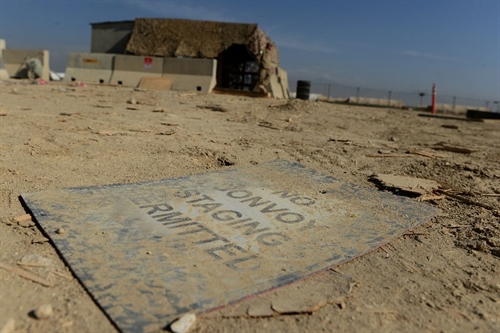 World
World

A massive Taliban truck bomb struck a hotel for foreigners on the outskirts of Kabul early yesterday, officials said, just days after the deadliest attack in the Afghan capital for 15 years.
 |
| The powerful bombing occurred close to the US-run Bagram air base north of Kabul. — AFP/VNA Photo |
KABUL — A massive Taliban truck bomb struck a hotel for foreigners on the outskirts of Kabul early Monday, officials said, just days after the deadliest attack in the Afghan capital for 15 years.
There was no immediate word on casualties from the powerful bombing, which occurred close to a military base next to Kabul’s international airport, and rattled windows several kilometres away.
The attack on Northgate, a heavily guarded compound for foreign contractors which was previously attacked in July 2013, underscores the worsening security situation as the Taliban ramp up their annual summer offensive.
"A truck packed with explosives struck the entrance of Northgate," an Afghan security source told AFP, without offering any further details.
Taliban spokesman Zabihullah Mujahid said insurgents armed with rocket-propelled grenades and other weapons blasted their way into the compound after the truck bomb went off.
He claimed that more than 100 "American invaders" were killed and wounded in the assault, which began around 1:30 am (2100 GMT Sunday). The Taliban are routinely known to exaggerate the toll from their attacks.
Afghan commandos cordoned off all arterial roads leading to Northgate, with erratic grenade explosions and gunfire coming from the scene after daybreak, local TV station Tolo said.
It added that NATO special forces were overseeing the clearance operation at the Northgate, a luxury enclave which had been fortified with blast walls, watchtowers and sniffer dogs.
The hotel was not immediately reachable by telephone.
Tremors from the powerful explosion, which was preceded by a power outage, were felt across the city.
The assault comes as the Taliban ramp up their annual summer offensive after a brief lull during the holy fasting month of Ramadan, which ended in early July.
Growing insecurity
A chillingly similar Taliban attack on the compound in July 2013 -- a truck bomb followed by a gun siege -- killed nine people, including four Nepalese and one Briton.
Monday’s attack comes after twin bombings left 80 people dead in the Afghan capital on July 23, in the deadliest attack in the city since the Taliban were ousted from power in 2001.
The bombings tore through crowds of minority Shiite Hazara protesters as they gathered to demand that a major power line be routed through the central province of Bamiyan, one of the most deprived areas of Afghanistan.
That attack claimed by the Islamic State group, which is less powerful than the Taliban but is making gradual inroads into Afghanistan.
Afghan forces backed by US airstrikes have since intensified an offensive against IS jihadists in their eastern stronghold of Nangarhar.
The latest attacks in Kabul are a grim indicator of growing insecurity in Afghanistan, which has resulted in large civilian casualties.
The UN last week said civilian casualties rose to a record high in the first half of 2016, with children in particular paying a heavy price as the conflict escalates.
Between January and June, 1,601 civilians were killed and 3,565 were wounded -- a four percent increase in casualties compared to the same period last year, the United Nations Assistance Mission in Afghanistan (UNAMA) said.
Yesterday’s assault illustrates the report’s finding that suicide bombings and complex attacks are now hurting more civilians than roadside bombs. — AFP




